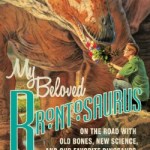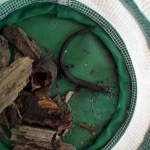Life Science
[Scene: In the car on the way from soccer to lunch at Five Guys. SteelyKid is in her car seat, studying the Halloween-themed temporary tattoos all over her arms.]
SteelyKid: Do bats fly right-side-up, or upside-down?
Daddy: From the bat's point of view, it's right side up more or less by definition. They do sleep upside down, though.
SK: Yeah, they're the only animals that spend their time upside down. Except sometimes monkeys. Monkeys can hang upside down from their tails, and sleep that way.
D: Well, they can certainly hang upside down sometimes. Sloths spend a lot of time hanging upside…
Back in July, Physics Today ran an article on Reinventing physics for life-sciences majors (I couldn't find an un-paywalled version, but this arxiv preprint seems to be close to it). As I've had some bad experiences with that class, I flagged it as something to read, but only got around to it last night. The main idea is that a "Physics for Life Sciences" course needs to be arranged around the way biologists think, which is fundamentally different than the way physicists think:
In general, physicists stress reasoning from a few fundamental principles—usually mathematically formulated—and seek…
One of the hot topics of the moment is the E. O. Wilson op-ed lamenting the way math scares students off from science, and downplaying the need for mathematical skill (this is not news, really-- he said more or less the same thing a few years ago, but the Wall Street Journal published it to promote his upcoming book). This has raised a lot of hackles in the more math-y side of the science blogosphere, while some in less math-y fields (mostly closer to Wilson's home field of evolutionary biology) either applaud him or don't see what the fuss is about.
The split, I think, comes from the fact…
Back in January, thinking about science topics to add to the book-in-progress, it occurred to me that I would really be letting down SteelyKid (and pre-schoolers everywhere) if I didn't take the opportunity to include something about dinosaurs. The problem with that, of course, is that I know next to nothing about dinosaurs, especially discoveries made since, say, 1981 or so. I remembered, however, that blogger extraordinaire Brian Switek had written a book about the latest on dinosaurs, My Beloved Brontosaurus. Sadly, a quick trip to Amazon revealed that it wasn't out yet, and in fact won't…
There are a bunch of physics stories that I'd sort of like to write about, but don't have time for, and politics is oscillating between "darkly hilarious" and "indescribably depressing," so that's best left alone. So, here's some cute kid pictures instead.
SteelyKid has lately taken to telling all and sundry "This is my daddy. He's a scientist." She also sometimes adds "I'm a scientist, too!" so it seemed appropriate to go out with her and Do A Science.
As previously mentioned, she got a bunch of Backyard Safari gear from my aunt and uncle, which included a safari vest and a collapsible mesh…
For her birthday, SteelyKid got a "Butterfly Keeper" set, which is basically a big mesh cylinder maybe two feet high and a foot in diameter. It came with a coupon for free live caterpillars for "Painted Lady" butterflies, which we duly sent away for. These came in a plastic cup full of caterpillar food, with paper across the top, and after eating most of the food, they climbed up and hung from the paper to form their chrysalises.
The instructions said to transfer the pupae to the mesh thing by pinning the paper to the top or side, which I did, with much delicate effort. Then, while moving…
In which we look again at the question of why, despite the image of physicists as arrogant bastards, biologists turn out to be much less collegial than physicists.
------------
While I was away from the blog, there was a spate of discussion of science outreach and demands on faculty time, my feelings about which are a little too complicated to boil down to a blog post in the time I have available. I did notice one thing in Jeanne Garb's guest blog post at Nature Networks:
Yet, given the current system, most scientists are choosing to keep a closed-notebook policy because they fear getting…
In which we look at the very latest in amphibian science.
------------
The embedded video shows one Prof. S. Kid describing her latest observations in detail. It's a very comprehensive study.
I've had limited success with this query on Twitter, probably because not that many people were reading late last night when I posted this, but I can give a little more context here, so it's worth repeating:
As part of something I'm working on but won't talk about yet, I'm interested in learning something about the context in which Darwin wrote On the Origin of Species.... For that reason, I'm looking for a recommendation of a book about the book, as it were: ideally something fairly concise that talks about the antecedents of Darwin's work. I'm sort of dimly aware that there were other…
Once upon a time, there were three giant hippopotamuses...
No, Daddy, it was three little pigs.
This is a completely different story, honey.
Once upon a time, there were three giant hippopotamuses, who lived together in a river in Africa.
They lived in a house.
Well, hippos spend most of their time in the water, so they really lived in the river.
But they had a house on the bank of the river, which was very nice.
OK.
And one day, something happened, which was...?
A big bad wolf came to their house!
No, honey, hippos live in Africa. They don't have big bad wolves in Africa.
Oh. Ummm... A…
Back when I reviewed Mann's pop-archaeology classic 1491, I mentioned that I'd held off reading it for a while for fear that it would be excessively polemical in a "Cortez the Killer" kind of way. Happily, it was not, so when I saw he had a sequel coming out, I didn't hesitate to pick it up (in electronic form, this time).
As you can probably guess from the title and subtitle, 1493 is about what happened after Europeans made contact with the Americas. This covers a wide range of material, from straight history, to biology, to economics, but the central theme of the whole thing is basically…
Shockingly, it does not seem to involve right-wing politics in any way. It's this explanation of why swirling wine in your glass clockwise produces different effects than swirling it counter-clockwise. a sample:
Like all living things wine cells have a magnetic polarity, just like humans and the Earth. The positive pole is more highly charged, just like the North Pole of the Earth, which is why there are Northern Lights in the Arctic Circle, but not Southern Lights in the Antarctic. This polarity tends to keep wine cells generally upright, spinning on their axis when they are being swirled.…
(This post is part of the new round of interviews of non-academic scientists, giving the responses of George Farrants, a freelance translator (and occasional marathon runner, as seen in the picture). The goal is to provide some additional information for science students thinking about their fiuture careers, describing options beyond the assumed default Ph.D.--post-doc--academic-job track.)
1) What is your non-academic job?
I work as a freelance translator from Swedish and Norwegian into English. I try to specialise in scientific, medical and technical texts, but I accept texts from many…
(This post is part of the new round of interviews of non-academic scientists, giving the responses of Jennifer Saam, who translates between different departments at a medical diagnostic laboratory. The goal is to provide some additional information for science students thinking about their fiuture careers, describing options beyond the assumed default Ph.D.--post-doc--academic-job track.)
1) What is your non-academic job?
I am a medical science liaison at a medical diagnostic laboratory.
I work in the medical services department and this department maintains the scientific integrity for the…
(This post is part of the new round of interviews of non-academic scientists, giving the responses of Richard Lobinske, a Hazardous Waste Manager (meaning he handles chemicals, such as these decades-old pesticides, not particularly noxious low-level employees). The goal is to provide some additional information for science students thinking about their fiuture careers, describing options beyond the assumed default Ph.D.--post-doc--academic-job track.)
1) What is your non-academic job?
Hazardous Waste Manager. I oversee a county household hazardous waste collection program that also handles…
(This post is part of the new round of interviews of non-academic scientists, giving the responses of Will Hendrick, who worked as a lab tech before returning to school. (This may seem like an odd inclusion, but there are people who do this sort of thing forever, so I think it's valid.) The goal is to provide some additional information for science students thinking about their future careers, describing options beyond the assumed default Ph.D.--post-doc--academic-job track.)
1) What is your non-academic job?
My official job title was 'Biological Materials Technician', and I worked for…
Thursday's post about the troubles of biomedical scientists drew a response from Mad Mike saying that, no, biomedical science Ph.D.'s really don't have any career options outside of academia, and pointing to Jessica Palmer's post on the same subject for corroboration. Jessica writes:
This is something I've tried to explain many times to nonscientists: most of the esoteric techniques I mastered during my thesis aren't useful outside a Drosophila lab. They're not transferable to any other field of biology, let alone any other scientific or nonscientific profession. Those skills I picked up on…
Via Mad Mike, a discussion of why it sucks to be a biomedical scientist:
87% of my blog-related e-mail is from unhappy, bitter, troubled, distraught biomed grad students, postdocs, technicians, and early-career faculty. Others write to me with problems, but these tend to be of the "I'm frustrated with my advisor" sort rather than the "I'm being tortured, abused, deported, sued, and I fear my academic career is over" sort that I routinely get from biomed people.
I specify biomedical rather than the life science in general because, as far as I can tell, the ecologists and botanists and…
Next up in our series of science-themed Christmas ornaments are these two dinosaurs:
Why? Because dinosaurs are awesome. Seriously, do you really need to ask?
The Nobel Prize in Chemistry for 2010 goes to Richard F. Heck, Ei-ichi Negishi and Akira Suzuki for giving people a reason to care about palladium. OK, it might not be the only reason-- I'm not actually sure what palladium is used for other than organic synthesis and cold fusion-- but it's the context in which I'm most likely to hear the element mentioned.
I don't pay that much attention to the Chemistry prize, so my reaction to this was mild surprise that it hadn't already won. Palladium catalyzed reactions turn up often enough when people are talking about making organic molecules for some…

